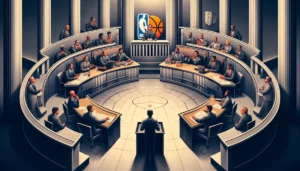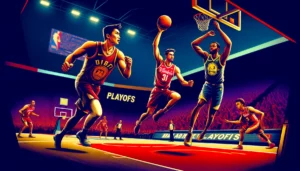How Much Do NBA Veterans Earn?
Discover the astonishing salaries of NBA veterans in this revealing article. Delve into the factors affecting their earnings and explore historical data and trends.

Are you curious about the jaw-dropping salaries that NBA veterans bring home? Well, wonder no more! In this article, we will unveil the eye-popping figures behind the earnings of these basketball superstars. Get ready to be amazed as we uncover the lavish lifestyles and financial success of NBA veterans.
1. Salary Cap and Maximum Contracts
Understanding the Salary Cap
In the NBA, the Salary Cap serves as a mechanism to ensure a level playing field among teams when it comes to player salaries. It is the maximum amount of total player salaries that a team is allowed to spend in a given season. The Salary Cap helps maintain competitive balance and prevents teams from dominating by simply outspending their rivals. It is determined by the league based on its revenue and is subject to yearly adjustments.
Maximum Contracts for NBA Veterans
Maximum contracts are the highest salary a player can receive based on their years of experience and the Salary Cap. NBA veterans who have played for 10 or more years are eligible for the highest maximum salary, while those with less experience have specific maximum salary limits. The maximum contract value is calculated as a percentage of the Salary Cap, and it increases with each year of service.
Exceptions and Allowances
While the Salary Cap imposes spending limits, there are exceptions and allowances that allow teams to exceed the cap under certain circumstances. These exceptions include the Bird Rights, Non-Bird Rights, Mid-Level Exception, Bi-Annual Exception, and the Luxury Tax Apron. These exceptions give teams limited flexibility in signing or re-signing players above the Salary Cap while still maintaining a competitive roster.
2. NBA Salary Structure
Different Salary Tiers
The NBA has a structured salary system that classifies players into different tiers based on their experience and skill level. This system helps regulate player salaries and ensures fair compensation based on a player's contribution to the team. Each tier has its own salary scale, with higher tiers reserved for more experienced and skilled players.
Rookie Scale Contracts
Rookie Scale Contracts are predetermined salaries for NBA rookies based on their draft position. This system prevents newly drafted players from negotiating higher salaries and ensures fair compensation based on their draft order. While the salaries are fixed for the first few years, players can earn higher salaries after their rookie contracts expire.
Mid-Level Exception Contracts
The Mid-Level Exception allows teams to sign or re-sign players to contracts that exceed the Salary Cap. It is a valuable tool for teams to add depth to their roster by attracting experienced players who might command higher salaries in the open market. The Mid-Level Exception is available to teams every season and is calculated based on the Salary Cap.
Veteran Minimum Contracts
Veteran Minimum Contracts are the lowest salary a team can offer a player with a specified number of years of NBA experience. This allows teams to fill out their roster with experienced players who may be willing to accept a lower salary to compete for a championship or be part of a contending team. Veteran Minimum Contracts provide a cost-effective way for teams to add veteran presence and leadership.
3. Factors Affecting NBA Veterans' Earnings
Experience and Skill Level
One of the main factors that influence NBA veterans' earnings is their years of experience in the league. Players with more experience often command higher salaries, as they have proven themselves over the years and bring valuable expertise to the team. Additionally, the skill level of a player plays a significant role in determining their salary. Highly skilled players are in high demand and are often rewarded with lucrative contracts.
Overall Performance
The performance of an NBA veteran on the court greatly affects their earning potential. Players who consistently excel in scoring, rebounding, or other statistical categories tend to have higher salaries. Their ability to contribute to a team's success translates into increased market value, leading to higher contract offers and endorsement opportunities.
Player's Position
The position a player plays also impacts their earnings. While all positions are vital to a team's success, certain positions, such as point guards or centers, may command higher salaries due to their specialized skills and impact on the game. Additionally, positions that require more physicality, such as power forwards or centers, can result in higher salaries due to the demand for their unique skill set.
Market Value and Demand
The market value of a player greatly influences their earnings. Highly sought-after players or those with a strong reputation in the league often have multiple teams vying for their services, which drives up their salary offers. The demand for specific skill sets or playing styles can also increase a player's market value and, subsequently, their earning potential.
Team's Financial Situation
The financial situation of a team can impact NBA veterans' earnings. Some teams may have more salary cap space or be willing to pay luxury tax penalties to sign or retain top-tier veterans. On the other hand, teams with limited financial resources may prioritize spending on other areas, leading to lower salary offers for veterans. A team's financial situation plays a significant role in determining a player's earning potential.
4. Historic Salary Data and Trends
Historical Salary Ranges for NBA Veterans
Over the years, NBA veterans' salaries have witnessed significant growth. In the early years of the league, salaries were considerably lower compared to today's standards. However, as the popularity of the sport increased and the NBA's revenue grew, players' salaries soared. Today, NBA veterans can earn millions of dollars annually, with top-tier superstars earning substantial sums.
Increasing Earnings over Time
The NBA has experienced a consistent upward trend in player salaries. The league's revenue growth, driven by factors such as television deals, merchandise sales, and global expansion, has enabled teams to offer more substantial contracts to veterans. This increase in earnings has provided players with greater financial security and has transformed the landscape of professional basketball.
Salary Discrepancies between Players
While top-tier NBA veterans earn significant salaries, there can be notable discrepancies in earnings among players. Factors such as market value, exceptional performance, endorsements, and negotiating skills can contribute to these discrepancies. Some players may secure lucrative endorsement deals that significantly supplement their on-court earnings, while others may have contractual limitations that restrict their earning potential.
5. Top Earning NBA Veterans
High-Paid NBA Superstars
The highest-earning NBA veterans are often the league's most talented and recognizable superstars. These players secure massive contracts due to their exceptional skills and marketability. Their on-court performance, combined with their wide fan base, endorsements, and brand deals, result in multi-million dollar earnings. These superstars become not only sports icons but also global brand ambassadors.
Salary Comparison across Positions
When comparing salaries across positions, it is evident that certain positions tend to earn higher salaries on average. Positions such as point guards, shooting guards, and centers historically command higher salaries due to their impact on the game and the demand for their services. However, this does not mean that players in other positions cannot secure substantial contracts – individual performance and market value also play significant roles.
Global Endorsements and Brand Deals
The endorsement market plays a crucial role in boosting NBA veterans' overall earnings. Players with global recognition often secure lucrative endorsement deals with top brands, showcasing their marketability beyond the basketball court. Through endorsement contracts, NBA veterans can earn millions of dollars annually, further contributing to their financial success and overall financial well-being.
6. Contracts and Contract Extensions
Length and Terms of NBA Contracts
NBA contracts typically have a fixed length, usually ranging from one to five years, with the option for a player or team to terminate the contract earlier in some cases. The terms of the contract outline the player's salary, bonuses, incentives, and other provisions such as trade clauses or player options. Contracts serve as a mutual agreement between the player and the team, ensuring both parties' rights and obligations are protected.
Team Options and Player Options
Team options and player options are contractual provisions that provide flexibility for both players and teams. Team options allow the team to decide whether to extend the player's contract for an additional year, while player options give the player the decision-making power to either extend or terminate their contract after a specified period. These options can impact a player's career trajectory and earnings potential.

